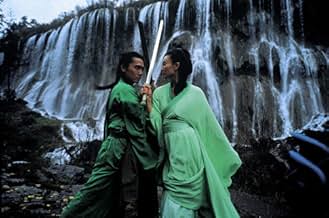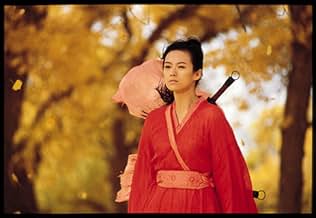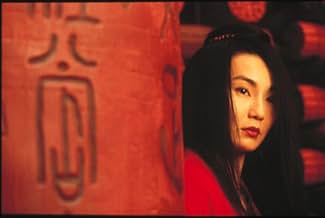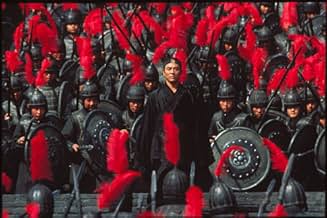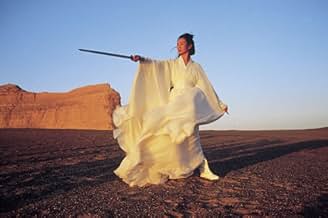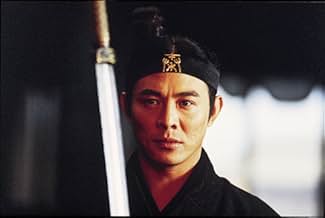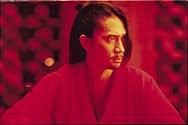El guerrero Sin Nombre llega al palacio del rey Qin y narra la historia de como luchó contra tres asesinos que aterrorizaban China.El guerrero Sin Nombre llega al palacio del rey Qin y narra la historia de como luchó contra tres asesinos que aterrorizaban China.El guerrero Sin Nombre llega al palacio del rey Qin y narra la historia de como luchó contra tres asesinos que aterrorizaban China.
- Dirección
- Guionistas
- Elenco
- Nominado a 1 premio Óscar
- 46 premios ganados y 48 nominaciones en total
- Broken Sword
- (as Tony Leung Chiu-Wai)
- Flying Snow
- (as Maggie Cheung Man-Yuk)
- Moon
- (as Zhang Ziyi)
- King
- (as Chen Dao Ming)
- Scholar
- (as Liu Zhong Yuan)
- Old Servant
- (as Zheng Tian Yong)
- Commander
- (as Zhang Ya Kun)
- Seven Qin Guards
- (as Hei Zi)
- Dirección
- Guionistas
- Todo el elenco y el equipo
- Producción, taquilla y más en IMDbPro
Opiniones destacadas
Hero is two sides of a tale as presented by Nameless (Jet Li), a mere Prefect who defeated three deadly assassins, and the King of Qin (Daoming Chen), the man the assassins wished to kill. Nameless weaves his heroic though modest story of how he killed the assassins, but the King remains unconvinced, spinning his own version of how he believed events unfolded.
Director Yimou Zhang takes us through Nameless' story first, spreading the battle sequences thick, allowing them to take their own time. In the King's version, certain battles are then revised, which is remarkably brave considering that some battles are utter fabrications. In one such fictitious fight, in a faultlessly designed set, Nameless and Sky (Donnie Yen) close their eyes and fight out the battle within their minds. Screen time is being spent lavishly on showing how two characters contemplated a fight, whilst fighting each other in a battle that never occurred. It is confusing certainly, but perhaps Zhang wished for his audience to get lost in the plot's design so that they would not question the warrantability of half of the battle sequences, which make up most of the film.
Yet, it is difficult to ponder these details when they are made so utterly insignificant when viewing such a spectacle. The sheer beauty of the battles, the gentle floating of the assassins as they fly around their arenas (which range from a forest full of orange leafed trees, crisp leaves falling down to the ground like rain, to the crystal clear and calm of a mountain lake), the costumes of characters at varying stages in the story line (red for passion, green for youth, white for truth, blue for love), the amazing army scenes which feature thousands of arrows being fired into the sky to create a black cloud that descends right on top of the camera, all these elements combine to produce a faultlessly perfect image on the screen, each frame a worthy photograph that gently reminds you why cinema is the greatest art form of the twentieth century.
And characterisation is not lost in this beauty as one may have feared. Despite the irritating two dimensional performance of Zhang Ziyi as Moon, the other actors carry off fine performances, especially Tony Leung Chiu Wai as Broken Sword and Daoming Chen as the King. Their performances are especially credible as they are often drowning in the memories of the King and Nameless - they need to change slight mannerisms in order to reflect whose mind they are now in.
The script too is of an impressively high standard. The moments of clarity that the warriors feel are experienced by the audience also, and there are some very informed outlooks of the emptiness of warfare, communicating that to achieve peace, sometimes war is the only option. These messages of course seem fitting in our current times, underlining how ancient some of the methods of our governing body truly are.
Hero is undoubtedly a most beautiful and awe inspiring film. What it lacks in plot substance, it makes up for with structure and script. It elaborates on the ground work created by 'Crouching Tiger' and is an experience that I would encourage you to seek out, as long as you are willing to submit to the film and let it guide you through its world on its own terms.
Rating: 4/5
Hero is a film that is beautiful in many aspects. The direction and photography is artsy without being pretentious. Every shot is worthy of being a work of art in itself. The language spoken is traditional mandarin, but oh, so easy to the ear, even though i couldn't understand every word. (I don't think Tony's and Maggie's voices were dubbed, but i could be mistaken). The main characters were very well acted out, especially that of the role of the Qin Emperor. Zhang Ziyi's character was largely insignificant though, so i think she's been put in to add some star power to the production. The fighting scenes are unusual by most standards, employing an interesting combination of CGI and real action. Some of the powers that the characters possess appear too amazing to be true, but remember that some of the fights only took place in the fighters' imagination. The music, though quite similar to that in CTHD, is appropriate, and sticks hauntingly to the back of your mind long after the movie is over.
I went to the cinema having heard some of the hype leading to the movie, but with no real knowledge of the storyline, and not expecting a lot. I think that helped me enjoy the movie more, because the way the story unfolded actually set me thinking and anticipating in a manner that i could not have had i known more about the storyline. The message at the end of the movie is simple, but certainly open for debate. In fairness, i don't think the director attempted to provide an answer, as to whether the decision made by the Nameless One was the correct one or not, but rather to ask questions. I'd better not give out too much here, but it certainly set me thinking about things for a little while after the show had ended. These days, any movie that can get me pondering after the credits go down has got to be pretty good.
Overall an excellent movie. I'm sure some areas could be better, but i can't think of any right now. Highly recommended.
Score: 8.5/10
Comprising, but not limited to outstanding duelling with a variety of razor sharp implements and tongues, a kaleidoscopic background of intense colour and beauty, several tangents to keep you on your toes, an immense scale that befits the telling of such a story with an elegance seldom encountered in Western culture when it comes to films of this time and age, buttressed through outstanding performances by the lead actors all round - outstanding.
First, there are scenes of haunting beauty("Duel in the yellow forest" and "Turquoise autumn" to site a couple) that, like the best of impressionist paintings, are so affecting that you will forever see the world in a slightly different way having once beheld them.
Secondly, the overall message of the film is a provocative one. The claim is that a degree of human casualties and suffering may be the optimal path to a better world, especially when the alternative is equally brutal chaos. This is not a popular theme. It has become much more fashionable to be anti-war in all cases. And understandably so, since variations of this logic have often been used in the past to justify atrocities. But the film provides a crisp litmus test for avoiding delusion: action must be taken with a heart void of malice and an unwavering commitment to the broadest possible ultimate outcome of good for all. Can anyone live up to this standard? Several characters in the movie do, each in their own way. If the standard could be met, would the world be a better place? These are questions worth reflecting on that have not been dealt with, to this depth, in any film I'm aware of.
Overall, I didn't think the story was that appealing except for the good message at the end, about the good of all being more important than satisfying one's personal vengeance. Well, who could argue with that? As for the rest, perhaps being a Westerner unfamiliar with Eastern culture, it's harder for me to relate to the mind-set. I would be interested to know how Asians viewed this story, as opposed to similar films.
Sometimes I think these wild Crouching Tiger-like action scenes are too long and overdone, but at least in this film they were very original and, once again, more visuals feasts than anything else. On my second viewing, I discarded the subtitles and went with the dubbed version to concentrate more on the stunning look of this film. It paid off. Even if I don't quite follow everything, each scene is such eye-candy that you can't go wrong viewing this.
¿Sabías que…?
- TriviaThe "red fight" between Moon and Flying-Snow was filmed in a forest in Mongolia. Director Yimou Zhang had to wait until the leaves turn yellow, and hired local nomads to gather even more yellow leaves in order to cover the ground completely. In fact, he was so fanatic about the leaves, that he had his crew separate the leaves into four different "classes" which were each put at increasingly farther lengths from the camera.
- ErroresAt the beginning of the movie, subtitles state that China was divided into seven warring states. At the end, the subtitles then state that "the King of Qin" unified China, without specifying which one. Historically, the king that was the one to unite all of the Chinese states was Ying Zheng (later changed name to Shi Huang Di) who inherited the throne from his deceased father at age 13 (as opposed to the age of the king in the movie). At the time, Ying Zheng began to rule China, the seven states were already reduced to two larger states (Qin and Chu) which was later dominated by Qin when Ying Zheng was 22 years old. It is therefore impossible for the same king shown in the movie to be the king that united all the Chinese states, although the end-note is semantically correct.
- Citas
King of Qin: I have just come to a realization! This scroll by Broken Sword contains no secrets of his swordsmanship. What this reveals is his highest ideal. In the first state, man and sword become one and each other. Here, even a blade of grass can be used as a lethal weapon. In the next stage, the sword resides not in the hand but in the heart. Even without a weapon, the warrior can slay his enemy from a hundred paces. But the ultimate ideal is when the sword disappears altogether. The warrior embraces all around him. The desire to kill no longer exists. Only peace remains.
- Versiones alternativasThe Director's Cut was 107:15 minutes, compared to the theatrical version at 96:23 minutes.
- ConexionesEdited into Ying xiong: Cause - The Birth of Hero (2002)
Selecciones populares
Detalles
Taquilla
- Presupuesto
- USD 31,000,000 (estimado)
- Total en EE. UU. y Canadá
- USD 53,710,019
- Fin de semana de estreno en EE. UU. y Canadá
- USD 17,800,000
- 29 ago 2004
- Total a nivel mundial
- USD 177,395,557
- Tiempo de ejecución1 hora 47 minutos
- Color
- Mezcla de sonido
- Relación de aspecto
- 2.35 : 1
Contribuir a esta página





